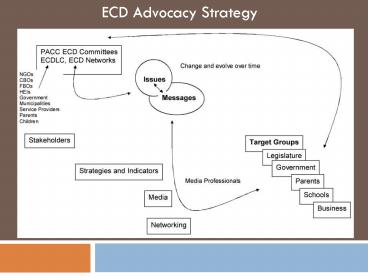ECD Advocacy Strategy - PowerPoint PPT Presentation
1 / 24
Title:
ECD Advocacy Strategy
Description:
Integrate child development, early stimulation and parenting information into ... conference sends a special message of condolences to all the families that have ... – PowerPoint PPT presentation
Number of Views:873
Avg rating:3.0/5.0
Title: ECD Advocacy Strategy
1
ECD Advocacy Strategy
2
Join the Global Early Childhood ADVOCACY Campaign!
3
Cornerstones to Secure a Strong Foundation for
Young Children
1. Start at the Beginning Integrate child
development, early stimulation and parenting
information into prenatal, early health, and
education services.
4
Cornerstones to Secure a Strong Foundation for
Young Children
2. Get Ready for Success Ensure access to at
least two years of quality early childhood care
and development services prior to formal school
entry, beginning with the most vulnerable and
disadvantaged children.
5
Cornerstones to Secure a Strong Foundation for
Young Children
3. Improve Primary School Quality Increase
investments and improve quality in Grades 1 - 3
of primary schooling by providing teachers with
knowledge and training in early childhood care
and development, adequate learning materials for
children and smaller classes.
6
Cornerstones to Secure a Strong Foundation for
Young Children
4. Include Early Childhood in Policies Address
early childhood in all national policies and
plans across sectors, including Poverty Reduction
Strategy Papers (PRSP) and Fast Track Initiative
(FTI), and ensure adequate resources and
multi-sectoral co-ordination.
7
AFRICAN NATIONAL CONGRESS
ANC 52ND NATIONAL CONFERENCE 2007 - RESOLUTIONS
8
- CHILDREN
- Recommend,
- The best interest of the child should be
paramount, with child-headed households as
priority for protection and care. - To prioritise the welfare of children and in this
regard develop, monitor and measure tools that
define and deal with child poverty - Strengthen the current safety nets that deal with
child poverty, ongoing murders, disappearances,
abuse and neglect. - Strengthen childhood development centres and urge
communities to understand and deal seriously with
the rights of children. - Develop a comprehensive strategy on Early
Childhood Development. - This conference sends a special message of
condolences to all the families that have missing
children and of those that were killed by adults
who are meant to protect them. The ANC abhors the
circumstances under which these children died and
commits to continue seeking justice to bring the
perpetrators to book.
9
Sate of the Nation Address Apex
Priorities Business Unusual
- Project 11 Ratchet up implementation of ECD
programme - Description
- Massively speed up implementation of the ECD
programme - expand the number of trained staff and
- double the number of sites and child
beneficiaries by the end of 2009
10
Apex Priorities Business Unusual
Organisational Implications Department of Social
Development, working with the departments of
Education and Health to supervise and monitor
implementation Cluster Responsibility Social
Cluster
11
What is this ECD programme?
12
National Integrated Plan for ECD in South Africa
Key aim . . . to bring greater synergy and
coordination to current government programmes . .
. in . . . ECD (page 4)
13
- Mechanisims for advancing ECD (page 15)
- Inter-sectoral collaborative planning and
service delivery - Agreement on target of the plan
- Creating inter-organisational activities
- Ensuring national and provincial budget
commitment - Co-ordination and monitoring
- Development of ECD management systems
14
- Results (page 16)
- Ability to expand service delivery
- Cost cutting through shared resources
- More efficient and speedy delivery of services
15
- Ultimately ECD should ensure that (page 18)
- All practitioners
- are supported as professionals with a career
ladder - ongoing professional development
- compensation to attract and retain
16
- Ultimately ECD should ensure that (page 18)
- All families
- are recognised as the first and main providers
- have access to ECD programmes that are
affordable and of high quality - participate
17
- Ultimately ECD should ensure that (page 18)
- All communities
- are accountable for the quality of ECD
- are backed by local, provincial and national
funding
18
- Primary Components (page 20)
- Integrated Management of Childhood Illness
- Immunisation
- Nutrition
- Referral for health services and for social
grants - Early learning stimulation
- Development and implementation of psychosocial
programmes
19
- Secondary Components (page 21)
- Human Resource Development
- parents, care givers and CDWs
- Infrastructure development
- building, upgrading and renovation of formal and
informal centres and the provision of water and
sanitation - Research
- inform and ascertain the effects of the proposed
services on child development - Monitoring and evaluation
- continuous
20
- Institutional arrangements (page 22)
- Political
- Core Group of Ministers Health, Education,
Social Development, and the Minister in the
Office of the President - Focal point Social Cluster strategic and
budget planning across departments - Similar arrangements at a provincial level
21
- Institutional arrangements (page 22)
- Operational
- National and provincial line functions (guided
by co-operative governance) responsible for
delivery - Coordinated planning and delivery
- However, each line department will only be
responsible for the budgeting and delivery of
components that fall within its core functions
22
- Section 3 Roles and Responsibilities
- NGOs and Partnerships
- NGOs have a major role to play as partners
- They will be
- Included in the various structures
- Consulted on development and implementation
- Co-opted to participate in the delivery process
- The integrated approach is strengthened through
a variety of partnerships
23
- Conclusion
- The environment for ECD is not perfect, but a
lot of important elements are in place
24
Get young children on every agenda. Advocate!































